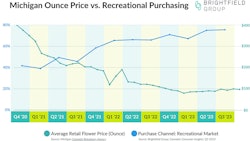
Curaleaf is leaving yet another state market.
The largest publicly traded cannabis company in the nation by market cap, the New York-based multistate operator sold off its vertical assets in Vermont, according to Vermont Business Magazine and VT Digger.
Zenbarn Ventures Inc., a social equity operator doing business as Zenbarn Farms with a dispensary in Waterbury, Vt., reported Dec. 1 that it had acquired Curaleaf’s Vermont assets, including a Vermont Patients Alliance dispensary in Bennington and a PhytoCare Vermont dispensary in Montpelier, as well as a greenhouse cultivation and manufacturing facility, according to Vermont Business.
Zenbarn provided the following statement on the acquisition: “This represents an opportunity to take our business to the next level and create something that will truly contribute to the Vermont community. We aim to foster a sustainable and equitable cannabis industry in the state of Vermont and are grateful for the groundwork laid by Curaleaf, which has set a strong foundation for continued success.”
A Curaleaf spokesperson confirmed with Cannabis Business Times that the company's Vermont exit is in the process.
Curaleaf Executive Chairman Boris Jordan told investors during the company’s third quarter earnings call Nov. 9 that Curaleaf exited its “low-margin, low-growth” operations in both Vermont and Michigan. He did not provide further details about these exits in his opening statement.
Notably, Vermont’s adult-use dispensaries reported $86.6 million in total sales during the first 12 months since commercial adult-use retail operations commenced in October 2022, according to the state’s Agency of Administration. Meanwhile, Michigan’s retail market is on pace to eclipse $3 billion in sales this year, representing 32% growth from 2022, according to the state’s Cannabis Regulatory Agency.
The Vermont and Michigan exits are in addition to Curaleaf closing down operations in California, Colorado and Oregon, an announcement the company made in January 2023. Curaleaf also consolidated its cultivation and processing operations in Massachusetts to a single facility at that time.
In March, Curaleaf also consolidated its two cultivation operations in New Jersey to a single facility.
“Throughout 2023, the company’s been focused on improving efficiency metrics and dialing in operations to maximize its existing base,” Jordan said. “We have taken significant steps to eliminate redundancies, strategically reduce headcounts [and] exit unprofitable markets. Most of these actions occurred in the first half of the year. And in the third quarter we took the final steps in our asset optimization plan.”
In addition to the Michigan and Vermont exits, Curaleaf’s third-quarter optimization actions included reducing “duplicative facilities” in Nevada from three grow sites to one facility, shuttering its Kentucky research facilities and consolidating the company’s R&D operations to Massachusetts and the U.K., Jordan said.
“These were difficult decisions, but I’m confident that they will better position Curaleaf for strong, consistent financial results going forward,” he said.
Jordan added that Curaleaf has reduced its total headcount by 18% in the past 12 months while further automating its manufacturing processes. The company has roughly 5,000 employees nationwide.
Specifically in Vermont, the Vermont Patients Alliance (VPA) assets that Curaleaf operated were from one of the original medical cannabis companies in the state that was acquired by Chicago-based Grassroots and later came under Curaleaf’s footprint when Curaleaf acquired Grassroots in an approximately $700-million deal in July 2020.
Brynn Hare, executive director of Vermont’s Cannabis Control Board, told VT Digger last week that state regulators were excited to see one of the state’s original retail facilities back in local ownership. “Nobody was thrilled” when the VPA license was acquired by an out-of-state company, she said.
While Curaleaf has completed 14 acquisitions in the past four years, the Grassroots deal remains one of the biggest in the industry during this era of state-by-state legalization.
Following that acquisition, Curaleaf had boots on the ground in 23 state markets in the U.S. Now, as of late 2023, the company’s footprint includes 17 state markets.
“I’m confident that our current 17-state exposure gives us the right domestic footprint and a presence in key markets that we expect will drive outsized growth over the next several years,” Jordan said. “We are now positioned to achieve our profit goals, and I do not foresee any further state exits."

























